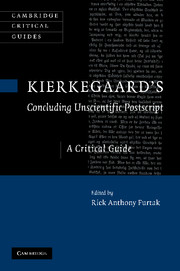Book contents
- Frontmatter
- Contents
- List of contributors
- Acknowledgments
- List of abbreviations
- Introduction
- 1 The “Socratic secret”: the postscript to the Philosophical Crumbs
- 2 Kierkegaard's Socratic pseudonym: A profile of Johannes Climacus
- 3 Johannes Climacus' revocation
- 4 From the garden of the dead: Climacus on interpersonal inwardness
- 5 The Kierkegaardian ideal of “essential knowing” and the scandal of modern philosophy
- 6 Lessing and Socrates in Kierkegaard's Postscript
- 7 Climacus on subjectivity and the system
- 8 Humor and irony in the Postscript
- 9 Climacus on the task of becoming a Christian
- 10 The epistemology of the Postscript
- 11 Faith and reason in Kierkegaard's Concluding Unscientific Postscript
- 12 Making Christianity difficult: The “existentialist theology” of Kierkegaard's Postscript
- Bibliography
- Index
12 - Making Christianity difficult: The “existentialist theology” of Kierkegaard's Postscript
Published online by Cambridge University Press: 04 August 2010
- Frontmatter
- Contents
- List of contributors
- Acknowledgments
- List of abbreviations
- Introduction
- 1 The “Socratic secret”: the postscript to the Philosophical Crumbs
- 2 Kierkegaard's Socratic pseudonym: A profile of Johannes Climacus
- 3 Johannes Climacus' revocation
- 4 From the garden of the dead: Climacus on interpersonal inwardness
- 5 The Kierkegaardian ideal of “essential knowing” and the scandal of modern philosophy
- 6 Lessing and Socrates in Kierkegaard's Postscript
- 7 Climacus on subjectivity and the system
- 8 Humor and irony in the Postscript
- 9 Climacus on the task of becoming a Christian
- 10 The epistemology of the Postscript
- 11 Faith and reason in Kierkegaard's Concluding Unscientific Postscript
- 12 Making Christianity difficult: The “existentialist theology” of Kierkegaard's Postscript
- Bibliography
- Index
Summary
Any attempt to identify the “theology” of Concluding Unscientific Postscript is confronted from the outset by several difficulties. First, Kierkegaard's pseudonym Johannes Climacus can hardly be said to be a theologian in any conventional sense of the word. He repeatedly emphasizes that he is not a Christian but a “dialectician,” “humorist,” and “psychologist” (CUP 378, 391, 405), who is concerned only to consider what steps he must take to acquire the “eternal happiness” promised by Christianity.
Secondly, the student of Climacus' theology is confronted by the challenge of the dialectical character of Postscript. Even a casual reader will be struck by how different this book is from conventional works of Christian theology. A glance at a selection of theological manuals published both in Kierkegaard's day and in our own age will confirm this impression. In such nearly contemporary works as J. P. Mynster's Betragtninger over de Christelige Troeslærdomme (1833) (Observations on the Doctrines of the Christian Faith) and H. L. Martensen's Christelige Dogmatik (1849) (Christian Dogmatics) we find Christian doctrines treated in a systematic and orderly way, beginning with definitions of religion, Christianity, and theology, before turning to the classic doctrines of the Christian faith such as revelation, God, Trinity, Christology, providence, sin, reconciliation, and so on. Similar approaches can be found in the work of more recent theologians. To take just one example, Wilfried Härle's Dogmatik opens with a discussion of dogmatics and the “science” of theology, before considering the individual doctrines that comprise Christianity.
Keywords
- Type
- Chapter
- Information
- Kierkegaard's 'Concluding Unscientific Postscript'A Critical Guide, pp. 219 - 246Publisher: Cambridge University PressPrint publication year: 2010

